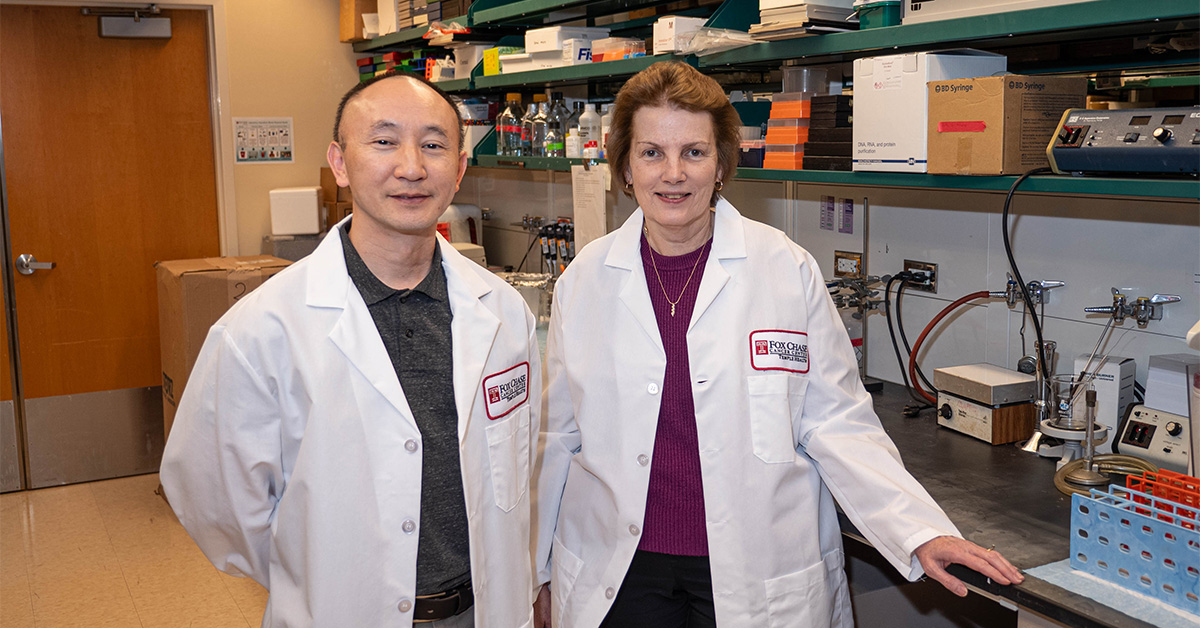
PHILADELPHIA (April 8, 2024) — In a study presented today at the American Association for Cancer Research (AACR) Annual Meeting 2024, researchers at Fox Chase Cancer Center showed that estrogen is metabolized extensively in both mouse and human lungs, ultimately contributing to the development of lung cancer in people who have never smoked. Investigators at Fox Chase are the first to report this finding.
In recent years, the incidence of non-small cell lung cancer (NSCLC) among never-smokers has continued to rise. Currently, 15% to 20% of patients diagnosed with NSCLC in the United States are never-smokers, which is defined as people who have smoked fewer than 100 cigarettes in their lifetime. The majority of cases are women and most tumors carry a mutation in the EGFR gene, a feature that helps distinguish these tumors from those of smokers.
“We are the first to discover that the lung can metabolize estrogen and then started looking at what the metabolites might be doing,” said Margie Clapper, PhD, Co-Leader of the Cancer Prevention and Control Research Program and Samuel M.V. Hamilton Chair in Cancer Prevention at Fox Chase, and senior author of the study.
The researchers found that exposure of noncancerous human bronchial epithelial cells to potent forms of estrogen for prolonged periods of time leads to the accumulation of double-strand DNA breaks and transformation, with cells acquiring characteristics of tumor cells.
“We performed a comprehensive analysis to see if we could determine the mechanisms underlying that transformation process,” said Mitchell Cheung, PhD, lead author on the study and an Assistant Research Professor in Clapper’s lab. “We found that metabolites of estrogen caused DNA damage in these normal cells.”
With assistance from Joseph Testa, PhD, Chief of Genomic Medicine at Fox Chase, the researchers performed a karyotype analysis, a process that allows researchers to visualize the integrity of the chromosomes in a cell.
“While normal cells have 23 pairs of chromosomes, cancer cells frequently acquire extra copies of chromosomes or small deletions,” said Cheung. “In the karyotype analysis, Dr. Testa found that exposure to estrogen metabolites induced a number of recurrent chromosomal abnormalities in these transformed cells. If tumor suppressor genes or oncogenes are being targeted by estrogen, these abnormalities are most likely important in the transformation process.”
The researchers also performed RNA-seq analyses to identify genes whose expression is altered in transformed versus normal cells. Using this technology, the investigators identified specific pathways in the cell that are important for the development of lung tumors in never-smokers.
“The plan is to target these pathways for early interception of lung cancer in the future,” said Cheung. To determine the relevance of these findings to lung tissue from patients with NSCLC, the group utilized The Cancer Genome Atlas database, which contains molecular data on a variety of common cancers.
“Most exciting was the discovery that the genes dysregulated by estrogen metabolites were not only altered in tumors from NSCLC patients, but more importantly, associated with a worse prognosis,” said Cheung.
“We have developed a noninvasive assay to measure various estrogen metabolites and have already discovered that NSCLC patients with tumors harboring mutant EGFR produce more carcinogenic estrogen than healthy control subjects,” said Clapper. “Our results suggest that modulation of estrogen metabolism may be a promising strategy for the early interception of NSCLC.”
The study, “Contribution of Estrogen Metabolites to Never-Smoking Lung Cancer,” was presented at the AACR Annual Meeting 2024, which is being held April 5-10 in San Diego.